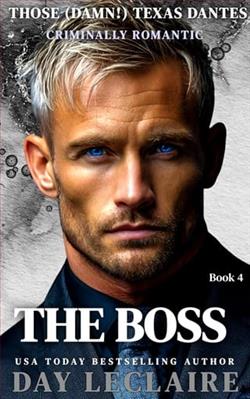Page 77 of Operation: Silent Angel
Cooper chuckled. “I see your point. But I can tell you in Cancun a few months ago, he was all Team Shepherd. He wouldn’t have been hired for the team had he been a hardcore solo operator.”
“I realize that as well,” Flores said. “As I said, just trying to force interaction between him and the team.”
***
The two vehicles continued on to Chicago Executive Airport, where the Learjet waited for them. The final push of intel came through from Cam Woods just before the plane took off into the blustery November sky. It was a bit of a bumpy ride until the plane climbed above the turbulent layer of the incoming storm system. There was nothing new or earth-shattering in Woods’ report. Williamson had no financial skeletons in his closet. His Lakeside Campground did okay. He wasn’t getting rich off of it, but it brought in an income that supported his family.
The flight was uneventful, and they soon landed at the small regional field in Conecuh County, Alabama. They stepped off the plane into calm, sixty-seven-degree air under a bright afternoon sun. All the men put sunglasses on; Flores and Gallop alsodonned baseball caps. The pickup trucks and boat waited for them as promised. They quickly transferred their gear from the plane to the pickups.
Mac flipped the lids of both of the coolers open to survey the food supplies inside. “Sorry, Robinson, not seeing any beer,” Mac called to him.
“I say we stop and get some if we pass a liquor store,” Robinson said. “Just to keep our cover.”
“I’m sure there is a bar near the lake and campgrounds,” Cooper said. “Might be a good place to see if anyone remembers our four missing men.”
And yes, sure enough, there was a bar nestled among the trees on the road that led towards the campground. It also had a hand-painted sign advertising bait for sale as well as beer. Pickup trucks were parked in front of it.
“I’m feeling aDeliverancevibe,” Robinson said.
“Deliverancetook place in Georgia, not Alabama,” Winston said.
“I’m just saying there are similarities,” Robinson argued.
“You’re being paranoid,” Gallup said.
“Fair warning, if I hear banjos, I’m outta here,” Robinson said, garnering him laughter from the rest of the team
They drove to the end of the road, where it dead-ended at the campground, and all entered the main office, a large building at the front of the campground, which also was a bait shop and a general store.
Cooper approached the main counter and met John Williamson, the owner. He was a balding white man in his mid-fifties, who matched his driver's license picture from the mission file. Cooper presented the Illinois driver's license under his cover name, John Wiess.
“Illinois,” Williamson remarked. “You drove a long way.” He glanced out the window at the two pickup trucks. “Why do your trucks have Florida plates?”
“I’m attached to the base in Pensacola,” Cooper said without missing a beat.
“You’re military, huh,” the man said. “Thank you for your service.”
“Thank you,” Cooper said. “We’re all looking forward to the next week of being out on the lake, maybe doing a little hiking.”
Robinson grabbed a case of beer from the cooler and set it on the counter beside Cooper. “I can’t believe we forgot beer. I’m happy to see this general store.” He enunciated his words with a fake Southern accent.
Williamson eyed Robinson and the others. “Now, John here may be active duty, but there’s no way y’all are.”
“No, sir,” Robinson said. “Happily retired for many years.” He laughed.
Williamson laughed with him. He completed the paperwork and then handed four room keys, actual metal keys, to Cooper. “Sorry, I don’t have six keys. You boys will have to share. I have you in cabin number twelve. Sorry, seven isn’t available. Twelve’s got a great view of the lake and is a bigger cabin, which will accommodate your party’s size better. Just follow the signs into the campground and you’ll come to it. And that’ll be eighteen even for the beer.”
Robinson handed him a twenty and stuffed the change into the St. Jude’s fundraiser can beside the cash register. They got back into the pickup trucks and drove into the campground, following the gravel road. They passed cabins one through six, all visible and accessible from the gravel road. The sign indicating cabin seven pointed at a dirt road that disappeared into a heavily wooded section. The road curved, and they caught a glimpse of the back of what they assumed to be cabin seven, and they got their first sight of the large lake, which lay down a hill from the road. Cabins eight through eleven were down another dirt road and dotted the banks of the lake. The road entered another stand of trees, and then cabins twelve through fifteen were on a dirt path that sloped down towards the banks of the lake, each shrouded from each other with thick bushes and trees, but visible from this road that overlooked them all.
The two pickup trucks took the road to their cabin. They’d hike in to take a closer look at cabin seven after doing recon to see if it was occupied or vacant.
Mac pulled himself from the backseat of the truck and took a moment to gaze at the expanse of the lake. It was a beautiful view. Fishing boats dotted the top of the dark blue waters that were bordered with tall trees all the way around. From the info on the area that Woods on the Digital Team had sent, Mac knew that this was the largest lake in the county. It was actually a reservoir that was formed by damming the Big Escambia Creek. The lake and the creek covered approximately six hundred acres, which translated to a lot of area to cover.
The men unloaded the vehicles. There were two bedrooms in the cabin, one with a queen-size bed, the other with two twins. And in the main room, which was a kitchen and living room, there were two couches. It was, as you’d expect, rustic and sparsely decorated, with unmatched dishes in the cabinets. There was a fireplace but no television. There was one bathroom with a small shower and no tub.
Cooper immediately put his bags on one of the twin beds. “Whoever doesn’t snore is welcome to join me.”
“I’ll claim the other bed if no one minds,” Mac said.















